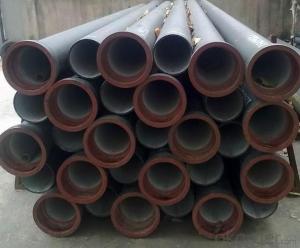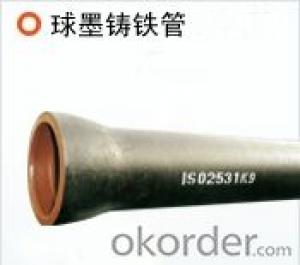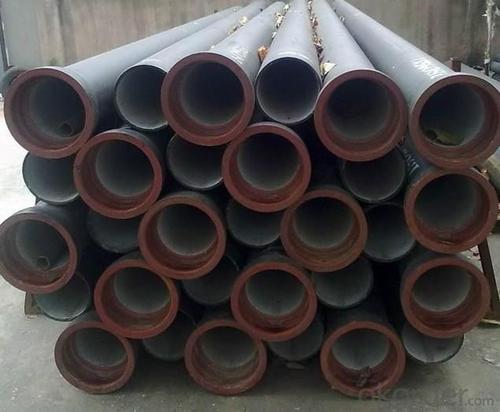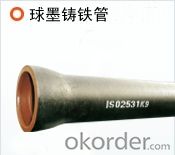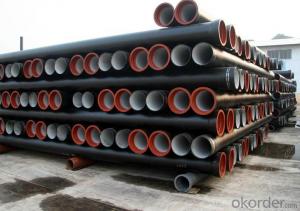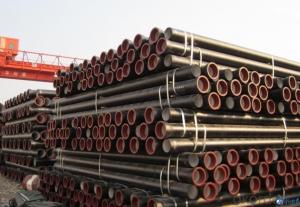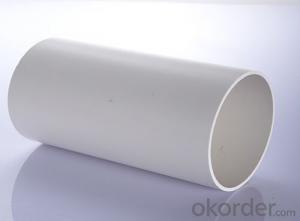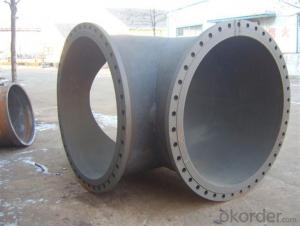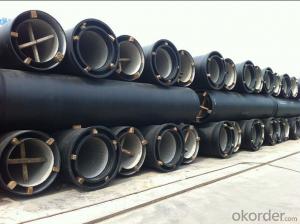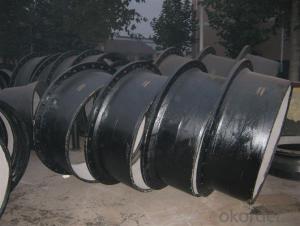Ductile Iron Pipe Cast Iron EN545 Class DN600
- Loading Port:
- China main port
- Payment Terms:
- TT OR LC
- Min Order Qty:
- 999 m
- Supply Capability:
- 9999 m/month
OKorder Service Pledge
OKorder Financial Service
You Might Also Like
1,Ductile Iron Pipe Description :
1) Pipes confirm to ISO2531,K9 class,T type joint,6m long,with inside cements lining conform to ISO4179, outside Zinc spraying(130g/m2) and bitumen coating(70μm) conform to ISO8179.
2) Pipe ends: Spigot and socket ends, with 100% SBR rubber gaskets accoding to ISO4633
3) we can do third party inspection according to customer's request.
4) Our products have been sold to many international market,such as Middle East and South East Asia and Africa.
2,Main Features of the Ductile Iron Pipe:
•High yield strength
•High tensile Strength
•High corrosion resistance
•Pressure Resistence
•Anti-corrosion
•Installation is convenient
•Satisfy the highest hygienic standards
1. Material: Ductile iron grade 500-7/ 450-10 in accordance with ISO1083
2. Standard: ISO 2531, EN545, EN598, ANSI, AWWA
3. Certificate: ISO9001, ISO14001, SGS, NSF, WRAS
4. Test: In accordance with ISO 2531 / EN 545 / EN598 and 100% water pressure test
5. Length: 6m or cut into 5.6m, 5.7m, 5.8m
6. Internal Lining: Cement, conform to ISO4179
3,Ductile Iron Pipe Images:
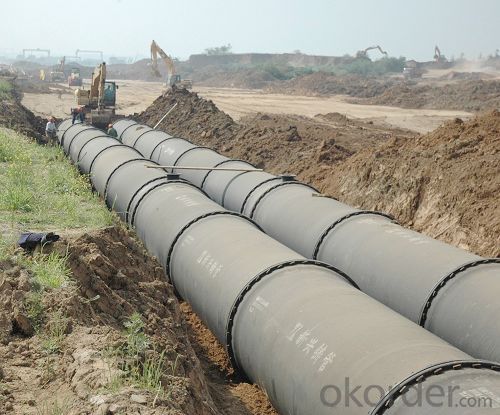
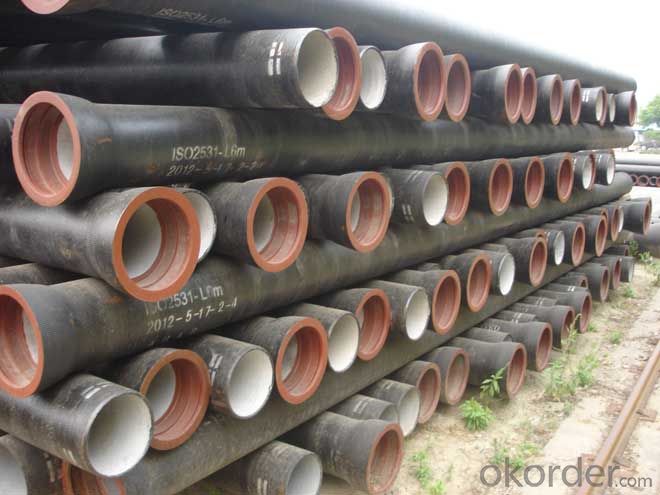
4. Ductile Iron Pipe Specification
Standard: API SPEC 5L 44th eidtion,ASTM A252-98(2007)
Grade: A53 Grades A/B, ASTM A106 Grades B/C,ASTM A179
AWWA, C200, ASTM A139, ASTM A120, API 5L Grade B
X42, X52, X56, X60, X65, X70, X80, X100
Weld Alternatives: LSAW
OD size range: 6.4~44.5mm
Wall thickness: 406.4~1422mm
Length: 3 - 12 m according to requirment
5.FAQ:
We have organized several common questions for our clients,may help you sincerely:
1.Q: Why would you choose ductile iron pipe rather than other pipe materials?
A:The reasons are obvious for that not only ductile iron pipe possesses the inherent strength and flexibility of ductile iron, combined with proven corrosion protection systems, but also the cost savings can be achieved from design to installation and commissioning.
2.Q:Why can you guarantee the inner of pipes can’t be corroded?
A: High alumina cement mortar lining and sulphate-resistant cement mortar lining. These two special linings are applicable to inner anti-corrosion for sewage pipes, improving resistance to erosion of the sewage components.
- Q: How does ductile iron pipe handle soil movements and settlements?
- Ductile iron pipe has excellent resistance to soil movements and settlements due to its high tensile strength and flexibility. The pipe's ability to withstand soil loads and settle without compromising its structural integrity makes it a reliable choice for underground applications. Additionally, the pipe's joint design allows for some degree of movement, further reducing the risk of damage or failure.
- Q: How does ductile iron pipe perform in high-pressure gas applications?
- Ductile iron pipe performs well in high-pressure gas applications due to its inherent strength and durability. Its ability to withstand high internal and external pressures makes it a reliable choice for transporting gases safely and efficiently. Additionally, ductile iron's resistance to corrosion and its tight joints further enhance its performance in high-pressure gas environments.
- Q: Can ductile iron pipe be used for hot water applications?
- Yes, ductile iron pipe can be used for hot water applications. Ductile iron pipe is known for its strength, durability, and high resistance to corrosion, which makes it suitable for a wide range of applications, including hot water systems. It can handle high temperatures and pressure, making it a reliable choice for transporting hot water. Additionally, ductile iron pipe's thermal conductivity properties allow for efficient heat transfer, ensuring that hot water is delivered effectively throughout the system. Therefore, when considering materials for hot water applications, ductile iron pipe is a suitable option.
- Q: Are ductile iron pipes resistant to abrasion?
- Indeed, abrasion is no match for ductile iron pipes. Ductile iron, a form of cast iron fortified with magnesium, undergoes this treatment to enhance its robustness and malleability. Consequently, it becomes exceptionally resistant to deterioration, including abrasion. These pipes find widespread use in scenarios where they encounter abrasive substances like sand, gravel, and other particles during fluid transportation. The material's remarkable capacity to endure abrasion guarantees its endurance and dependability across diverse sectors, ranging from water distribution and sewer systems to industrial pipelines.
- Q: Can ductile iron pipes be used for bridge drainage systems?
- Indeed, bridge drainage systems can make use of ductile iron pipes. Ductile iron, a resilient material, finds widespread use in numerous applications, such as water and sewage systems, owing to its strength and durability. With exceptional resistance to corrosion, it is capable of enduring substantial loads and pressure, rendering it an ideal choice for bridge drainage systems. Moreover, the smooth inner surface of ductile iron pipes facilitates efficient water flow, preventing the occurrence of clogs and blockages. Therefore, given their robustness, longevity, and capacity to handle the necessary water flow, ductile iron pipes prove to be a fitting option for bridge drainage systems.
- Q: Can ductile iron pipes be used for hydropower projects?
- Yes, ductile iron pipes can be used for hydropower projects. Ductile iron is known for its strength, durability, and resistance to corrosion, which makes it suitable for various applications including hydropower projects. These pipes can effectively handle the high pressure and flow required for hydropower generation, making them a reliable choice for this purpose.
- Q: What are the different pressure classes available for ductile iron pipes?
- The different pressure classes available for ductile iron pipes typically range from Class 150 to Class 350.
- Q: How much pressure can the ductile iron pipe socket meet?
- If you let him as the supporting points, I do not recommend this
- Q: How are ductile iron pipes protected against stray current corrosion?
- Ductile iron pipes are protected against stray current corrosion through the implementation of various preventive measures and protective coatings. Stray current corrosion occurs when an electric current passes through the pipe, leading to accelerated corrosion and potential damage. To prevent this, the following measures are typically adopted: 1. Electrical isolation: Ductile iron pipes are electrically isolated from other metallic structures using insulating materials, such as rubber gaskets or non-conductive coatings. This isolation prevents the flow of stray current through the pipe, minimizing the risk of corrosion. 2. Cathodic protection: Cathodic protection is a widely used technique to protect ductile iron pipes from stray current corrosion. It involves the installation of sacrificial anodes or impressed current systems near the pipe. These anodes or systems release a controlled electric current, which counteracts the stray current and ensures that the iron pipe remains cathodically protected. 3. Coatings: Ductile iron pipes are typically coated with protective layers to enhance their resistance against corrosion. One common coating is a fusion-bonded epoxy (FBE) coating, which provides a high level of protection against stray current corrosion. FBE coatings act as a barrier, preventing the electrical contact between the pipe and the surrounding environment. 4. Monitoring and maintenance: Regular monitoring and maintenance are essential to ensure the ongoing protection of ductile iron pipes against stray current corrosion. This involves inspecting the protective coatings for any damage or degradation and promptly repairing or replacing them as needed. Additionally, monitoring systems can be installed to detect and measure stray currents, allowing for timely intervention if necessary. By implementing these protection measures, ductile iron pipes can effectively guard against stray current corrosion, prolonging their lifespan and ensuring the integrity of the pipeline infrastructure.
- Q: What is a graphite cast iron pipe?
- There is a graphite tube, but there is no graphite cast iron (if not ductile iron)
Send your message to us
Ductile Iron Pipe Cast Iron EN545 Class DN600
- Loading Port:
- China main port
- Payment Terms:
- TT OR LC
- Min Order Qty:
- 999 m
- Supply Capability:
- 9999 m/month
OKorder Service Pledge
OKorder Financial Service
Similar products
Hot products
Hot Searches
Related keywords
